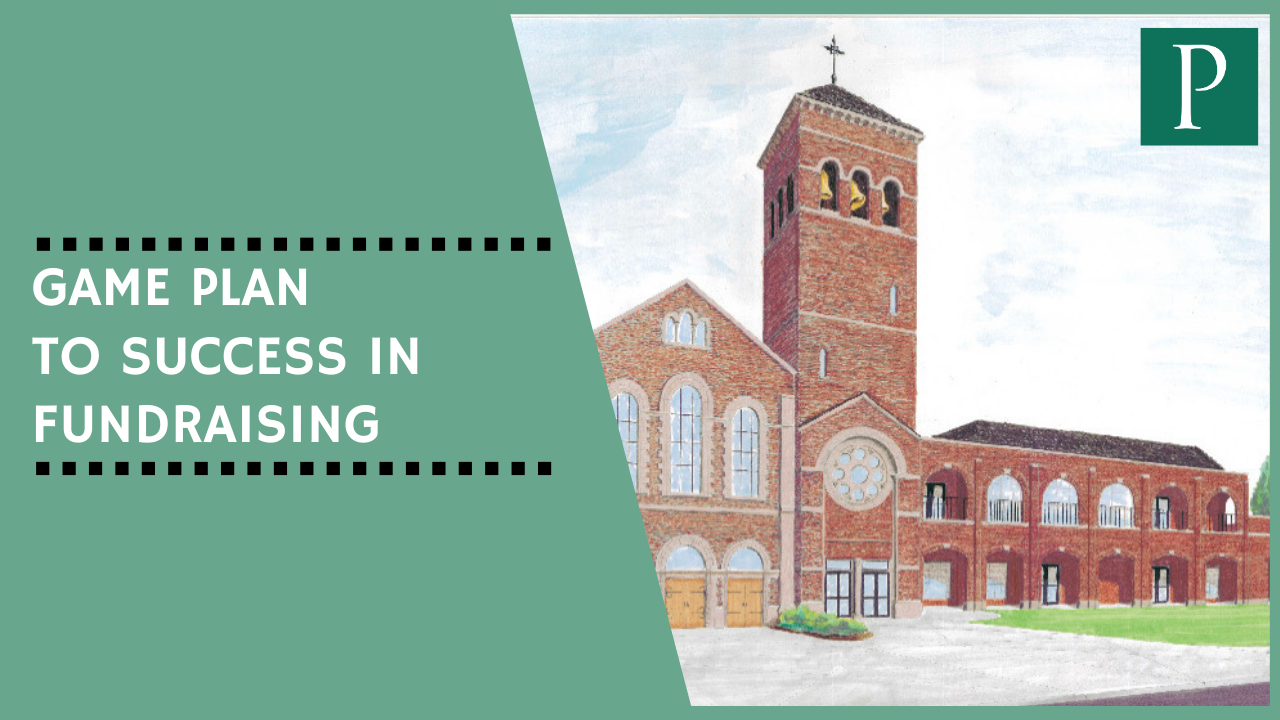Game Plan to Success in Fundraising

By Mary P. Walker, Petrus Blog Contributor & Local Charity Board Member
There is no guarantee that a particular football team will win a particular game. Also, there is no guarantee that a fundraising team will reach its goal. However both are more likely if they study, train, and have a plan. In both football and fundraising, luck/grace can move things along, but luck/grace tends to gravitate toward teams that are open, “in shape,” practiced, and ready.
The success experienced by St. John Catholic Student Center at Oklahoma State University in Stillwater proves this point. The community at St. John’s has a compelling vision for a church that will serve OSU for the next 100 years. They are executing a $25 million campaign, called Building Saints for the Kingdom. They are raising funds for a new church, expansion of ministry, and an endowment.
With $16.3 million in hand or pledged, they are looking forward to “making a statement” with the demolition of the current center for the graduation crowd in May.
Thomas Edison is often attributed with saying, “Vision without execution is hallucination.”
In a conversation with Matt Bond, development director, we discussed why their vision is becoming real. Of course, God has blessed the project with some luck/grace. Donors committed at the right time, and one even came “out of the blue.” Yet, further into the discussion, it became obvious that God’s blessing is working powerfully through great leadership, communication, coaching, preparation, and execution of good fundraising practices. What can we learn from St. John’s?
Prayer is vital. We can’t underestimate the help, wisdom, guidance, and even protection from bad decisions, that God gives us when we pray. Frequent prayer reminds us that we are doing holy work—especially during those inevitable times when we feel discomfort and discouragement. A campaign should start with prayer and be grounded in prayer. Prayers for success overall, and prayers before calls, meetings, mailings, and important decisions remind us that a campaign is ultimately a means to empower God’s work. And never, ever forget to thank God for achieving milestones!
Second, teamwork is essential, and not only within the development team. As Catholic ministries, we strive to work in harmony with our local bishop. Our bishops can open doors, make valuable introductions, challenge us to find answers to tough questions, and deploy the resources of the diocese. Matt praised Bishop David Konderla of the Tulsa Diocese for his insight, support, and encouragement. While you can’t control who God, in his wisdom, places as your bishop, you can keep communication open and work toward a cooperative relationship.
Just like every football player needs to “be in shape,” master the fundamentals, and execute their role in the game plan, the team of pastors, directors of ministry, and development professionals must do the same. St. John’s brought Petrus onboard to lead them through the discipline of a feasibility study to define the scope of their project, identify possible benefactors, plan the strategy, get the training needed, and hold them accountable for action.
The challenge of every campaign is to connect potential benefactors to the vision in a deep and personal way. The St. John’s team recognized that they aren’t asking for a donation. Rather, they are asking for an empowering investment that will continue to pay off over the next 100 years at OSU and within the Catholic Church, as students graduate and assume leadership roles in their parishes. Because the future church is across from OSU property and in the heart of the sports complex, the vision animates the imagination of a grand Catholic presence for all to see. This insight influenced a church design that the pastor and development team could proudly show, and infused them with an excitement that was contagious.
In addition, the team connected benefactors with their more personal memories of their experiences at St. John and their desire for students, perhaps even their children or grandchildren, to be formed with the riches of the Catholic faith during their college years.
By now, you’ve noticed that the St. John’s team invested in relationships with their benefactors long before they made “the ask.” They researched, listened, questioned, and learned. As I talked to Matt, I could hear in his voice how much he enjoyed this process. Also, I’m sure the benefactors had fun telling their stories, and imagining how their own personal story would be enriched by supporting the campaign goal.
Finally, the St. John’s team, like a winning sports team, used their assets and found ways to make up for challenges. Their vision is powerful, exciting, and compelling. Assistant director of development and communications, Taylor Akins, does a fantastic job in making the vision personal and relatable. Father Kerry Wakulich is a dynamic, approachable pastor who enjoys fundraising for God’s kingdom. Matt’s personality is friendly, open, and enthusiastic.
Yet, they also face challenges. Recently, St. John’s transitioned from a parish that served students and permanent parishioners to focus on their ministry to students. Of course, the collection-based support of former parishioners was lost, and other benefactors willing to support the annual budget had to be found. And, is there any ministry anywhere that hasn’t been affected by the pandemic? The St. John’s team had to pull back from in-person calls, and is just now resuming their stride.
Matt points out that while St. John’s assets are many and valuable, all organizations have assets that can be leveraged for development. In our day-to-day work, we may take them for granted, and are much more likely to focus on our organization’s liabilities. Perhaps we have a dynamic pastor, an enthusiastic student team willing to go on development calls, a “celebrity” benefactor who will “talk up” the ministry, a catalog of stories about “making a difference,” experts in various disciplines ready to help, or a compelling need that everybody recognizes.
Finally, Matt cautions against development directors assuming all the weight of fundraising. Fundraising is a team sport. God is the team owner, general manager, and head coach. He wants to empower the team and, at times, reward the team with some good luck/grace. Our responsibility is to prepare, “get in shape,” train well, and execute the game plan.
You can reach Matt at mbond@catholicpokes.com and find more information about the campaign at https://buildingsaints.com/.
READY TO BECOME A BETTER FUNDRAISER?
Sign up below to receive tools, ideas, and inspiration to take your development efforts to the next level.
We hate SPAM. We will never sell your information, for any reason.


